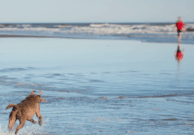Not all dogs are born knowing how to swim. Even if you have a breed that’s know for loving the water, you might still might be teaching your dog to swim! And helping him learn now will not only strengthen your bond, but will set you up for a lifetime of fun together.
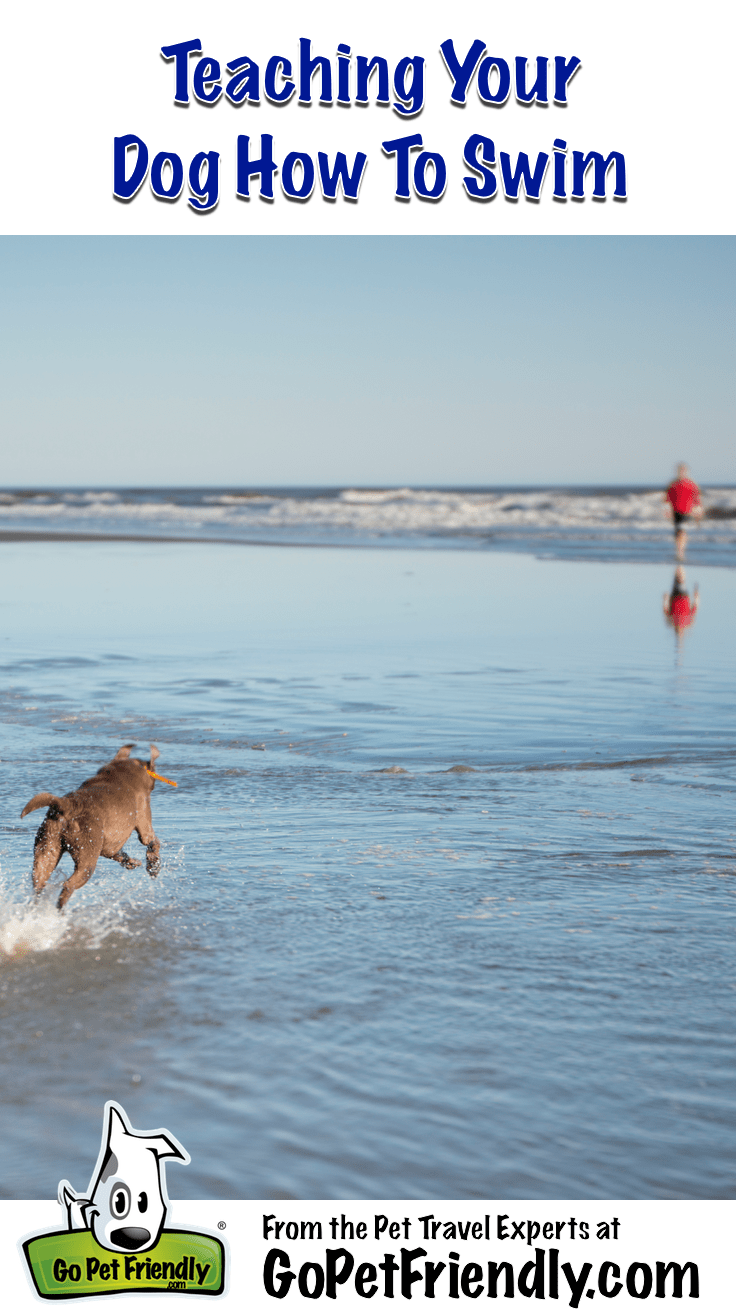
Why Spend Time Teaching A Dog To Swim?
Every year, an estimated 10,000 dogs drown in the United States. Most of these tragedies occur when dogs get into a pool and can’t get out. Just like people, once an animal is in the water, they quickly tire splashing about. So, teaching your dog to swim is one of the most crucial skills he can learn.
Teaching your dog to love the water while he’s young has additional benefits besides safety. Swimming can be a safe aerobic exercise for dogs with arthritis, those with joint or spinal issues, or dogs that are overweight. In these situations, water supports the body, which reduces pain while allowing them to burn calories.
Swimming is also and excellent way for dogs to burn off excess energy. In fact, it is such great exercise that owners of performance dogs (those competing in agility, flyball, herding, frisbee, tracking and obedience) often use swimming to keep their dogs in top physical condition.
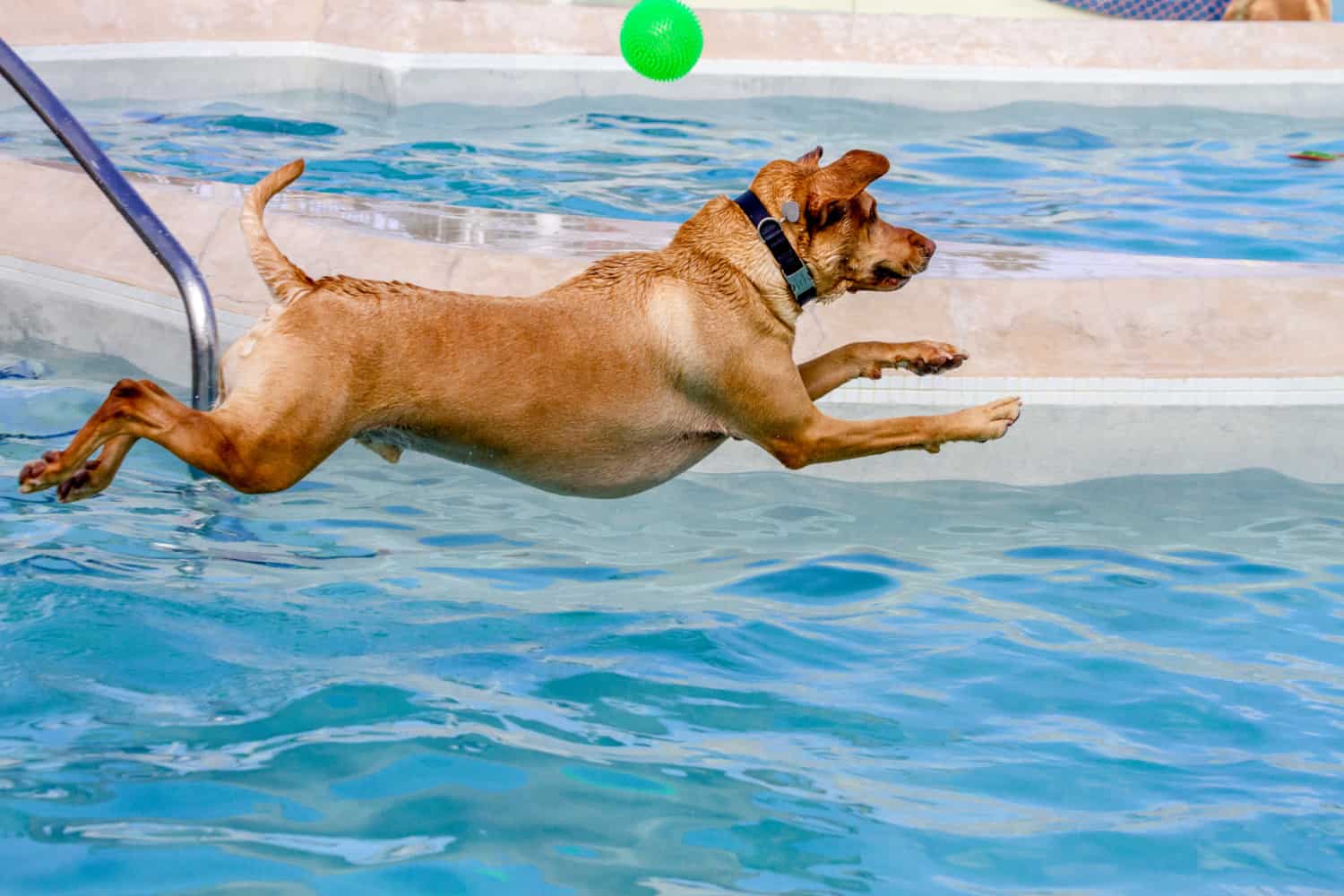
Does Your Dog Want To Swim?
Swimming is fun for a lot of dogs, but others are afraid of or don’t like the water. And some breeds are not naturally built for water sports.
The short-necked, large-chested breeds like Bulldogs can have trouble keeping their heads above water. And even some Retrievers and Spaniels need a little practice to perfect their “doggie paddle.”
GoPetFriendly fans will know that Myles is not a fan of being wet under any circumstances. He even walks around puddles! So, he’s happier admiring the water from a distance.
But Buster loved to swim! Amy and Rod spent many years locating pet friendly beaches where Buster could enjoy playing in the waves.
DO MORE ⇒ Best Pet Friendly Beaches In Florida

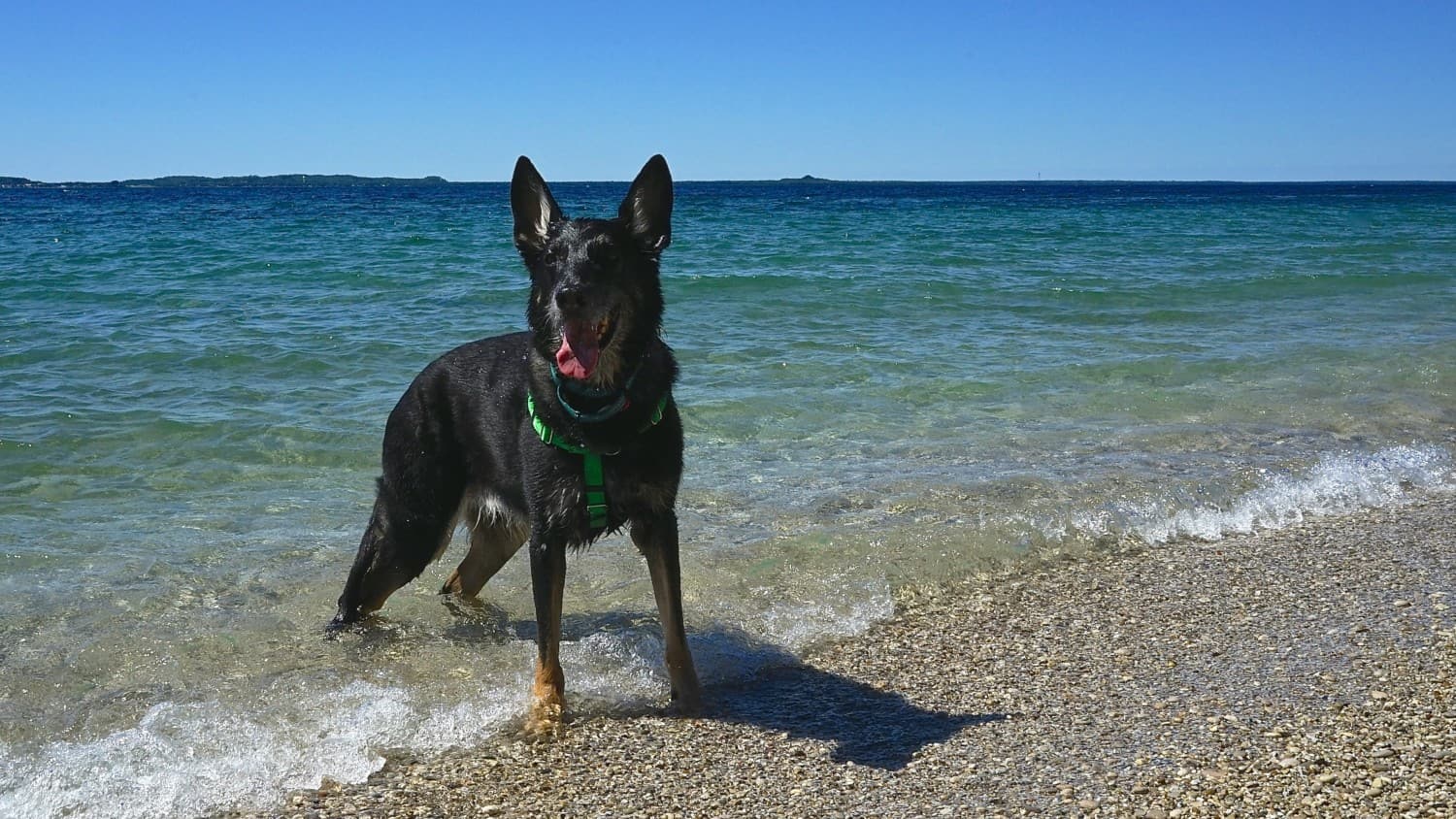
Assessing Your Dog’s Swimming Skills
So how will you know where your dog falls on the scale from “might melt if splashed” to “natural born swimmer?” One telltale sign is if the only way he’ll get in the water is on a raft!
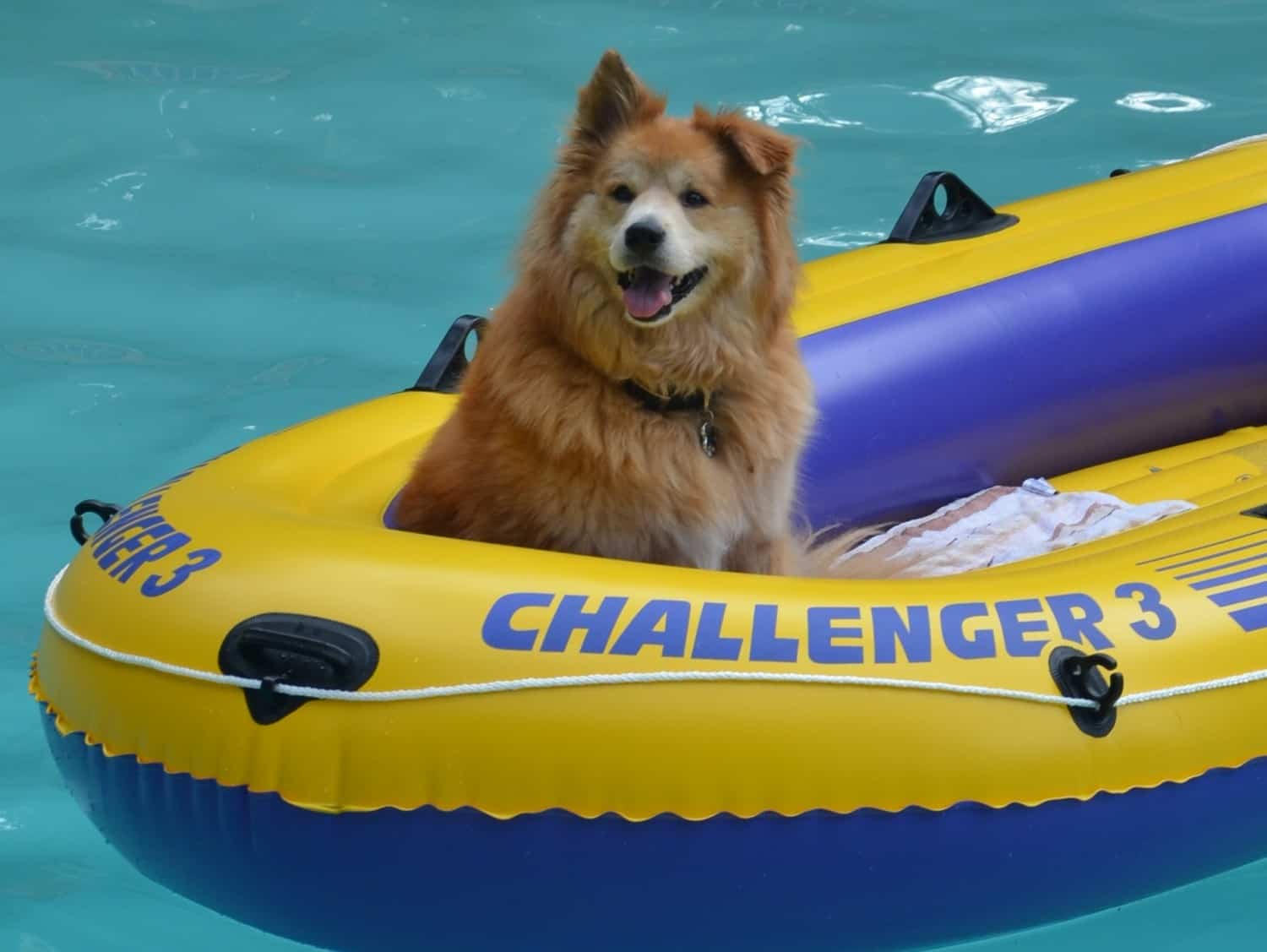
Actually, there’s an easy way to tell if swimming is one of your dog’s intrinsic skills. Just hold your pup, or walk with him on leash, in the water. If he struggles to return to dry land, your biggest challenge will likely be helping him overcome his fear. Use toys, treats, and a lot of patience to teach your dog swimming is fun. Or resign yourself (like Amy and Rod did with Myles) that swimming is not going to be one of your dog’s favorite activities.
If your dog starts paddling in the water, but only uses his front legs and slaps the surface with his back paws, he has the skills but will need some help from you to learn to swim. With a little time and support, your pup will learn to incorporate his hind legs and tail to stay afloat.
Finally, if your dog starts kicking his front and back legs in a coordinated motion, he’s got this! You lucked out with a dog who was born with the ability to swim.
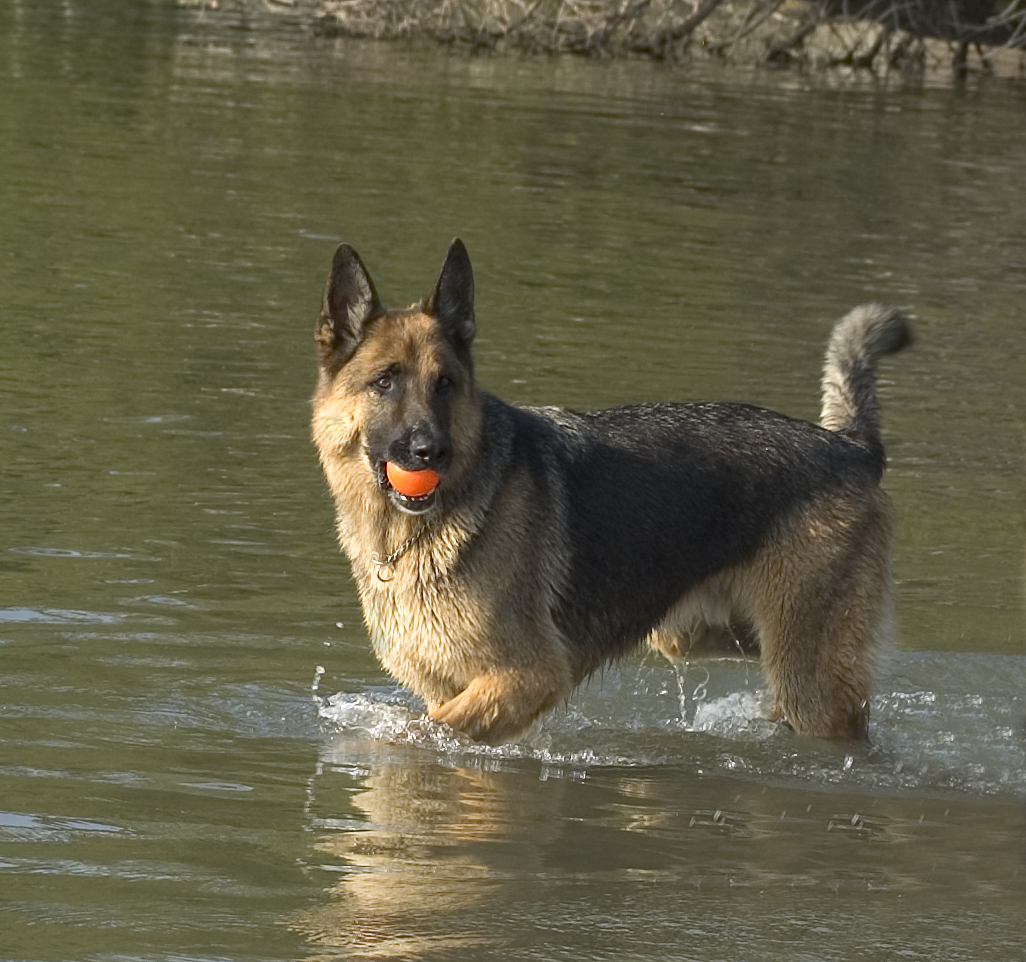
Teaching Your Dog To Swim – Safety First
When teaching your dog to swim, a few simple rules can make for a lifetime of fun.
- NEVER EVER leave your dog unsupervised around the water! Install a pool fence or safety alarm, and make sure your dog knows where the steps or ramp are located. You can even place a large vertical marker, like a plant or a flag, by the steps or ramp to help your dog orient himself.
- Teach your dog to find the steps by gently placing him in the water with his feet on the top step and saying “steps” while he gains his footing. Then, take him a short distance away and let him swim to the steps, gradually increasing the distance.
- Dogs need to get used to wearing a life vest. Give your pup plenty of time to figure out how his life vest works so he’s comfortable wearing it in the water.
- During your lessons, maintain control of your dog by using a leash or long line attached to his dog life jacket. Stay in the shallow end, and keep the lessons short – no more than ten minutes. Dogs can’t tread water like humans and will tire quickly, unable to rest with their feet on the bottom.
- If you swim in lakes or other natural bodies of water, vaccinate your dog against Giardia, which can cause vomiting and diarrhea and can be passed along to you.
- Avoid water with a strong current, and stay away from boating and fishing areas where underwater hazards are more likely. Also look for stumps or rocks hidden in the water that your dog could land on when jumping.
- Avoid swimming in water over your own head. A panicked pooch might try to “climb aboard” and push you under.
- Food stays in your dog’s stomach longer than in yours. To prevent bloat, a potentially deadly condition, wait 1 ½ to 2 hours after eating before taking a swim.
- Know pet first aid and brush up on your skills regularly.
- Keep the directions to the nearest emergency veterinarian on hand – just in case!
READ MORE ⇒ What You Should Know About Emergency Vets Before You Need One
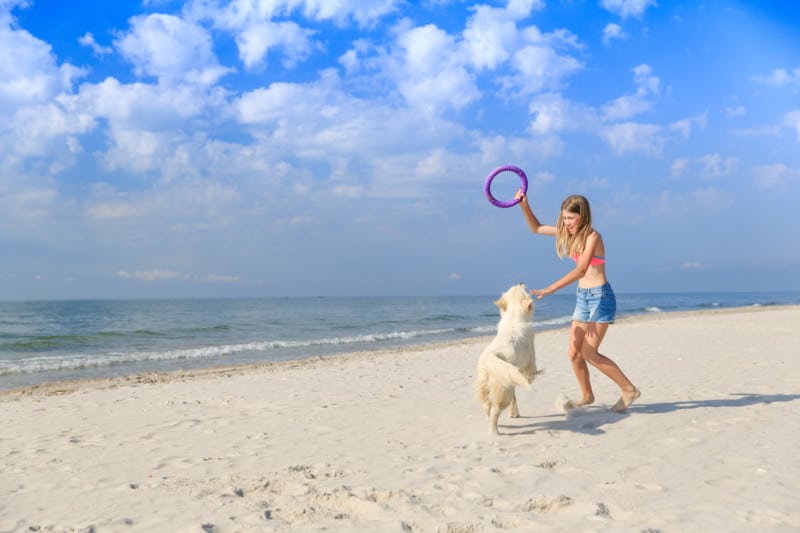
Start Slowly
When you’re teaching your dog to swim, you want to avoid bad experiences. Make sure the water isn’t too cold, and never throw or push your dog into the water. Instead, lure him in with a water toy or treat. Many dogs will be happy to wade in as long as they can feel the bottom.
Take Frequent Breaks
Some dogs love the water and won’t want to stop. If your dog starts breathing heavily or if his back end begins to sag in the water, it’s time to get out and take a rest.
Rinse Off To Keep Your Dog Healthy
Chlorine can irritate skin and eyes, and bacteria from lakes or rivers can make your pet sick. After swimming, rinse or shampoo your dog’s coat, and take special care to dry out his ears well.
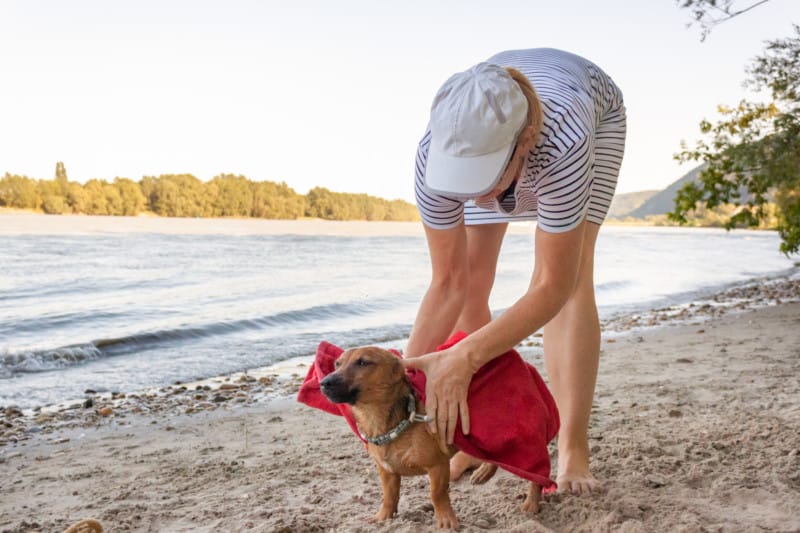
Have Fun Teaching Your Dog to Swim
Although dogs generally want to please us, you’ll know if your dog is truly enjoying the water. Every sport is not for every person or every dog! Wading in the kiddie pool might be more his speed. Or maybe he’s just a land-lover at heart. But if your dog is having fun, you will too!
More Water Sports
Once he knows how to say afloat and how to get in and out of the water, there are many other fun activities you can do with your canine buddy! Canoeing, kayaking, paddle boarding, boating, dock diving, retrieving contests, and even team swims await you and your four-legged Michael Phelps or Amanda Beard.
READ MORE ⇒ Tips for Canoeing or Kayaking With Dogs
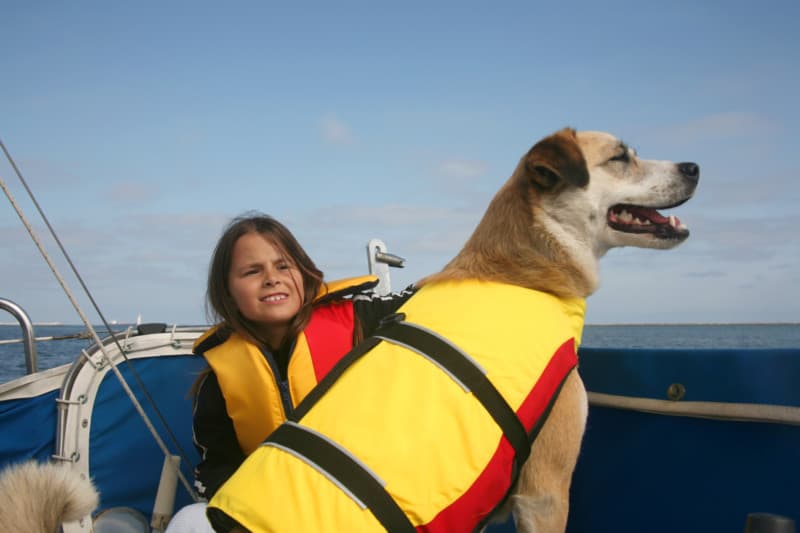
Just remember to be patient and keep your lessons short. Before you know it you and your dog will be having a great time splashing together!

About the Author: Pet safety crusader, Denise Fleck is an award-winning author & radio show host and animal care instructor who developed the curriculum for her Pet First-Aid & CPCR Classes after training with dozens of schools and organizations, practicing, attending seminars and practicing some more.
(Visited 35,076 times, 1 visits today)
Credit : Source Post
